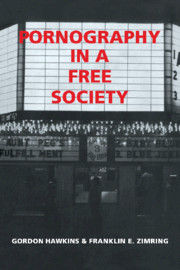Book contents
- Frontmatter
- Contents
- List of tables and figures
- Preface
- Acknowledgments
- I Pornography and the pornography commissions
- II Public policy after liberalization
- Introduction
- 6 Pornography and the subjugation of women: the radical feminist challenge
- 7 Pornography and child protection
- 8 Pornography in perspective: social response in the noncensoring society
- 9 Notes toward the future
- References
- Index
6 - Pornography and the subjugation of women: the radical feminist challenge
Published online by Cambridge University Press: 21 October 2009
- Frontmatter
- Contents
- List of tables and figures
- Preface
- Acknowledgments
- I Pornography and the pornography commissions
- II Public policy after liberalization
- Introduction
- 6 Pornography and the subjugation of women: the radical feminist challenge
- 7 Pornography and child protection
- 8 Pornography in perspective: social response in the noncensoring society
- 9 Notes toward the future
- References
- Index
Summary
In this chapter we review the lively recent debate on pornography and women's rights from what has been called the “radical feminist perspective. ” After a brief historical introduction, we review the critique by two radical feminist writers, Andrea Dworkin and Catharine MacKinnon, as well as critical reactions to this theoretical perspective. We then consider the issue of the impact of pornography on the status of women from outside of the framework of the Dworkin–MacKinnon point of view.
The relationship between pornography and the status of women is a broad and multifaceted topic, one that deserves book-length treatment on its own. Even the ostensibly narrow topic of pornography and feminist thinking quickly broadens when the reader confronts the wide variety of feminist perspectives and the very different policies toward pornographic communication they imply.
Such broader concerns with feminist theory are beyond our present scope and our scholarly capacities. But the focus on the Dworkin–MacKinnon analysis as a particular subject for a chapter requires a specific justification.
The particular feminist critique we consider here is both conceptually novel and historically important. The label “radical feminist” is the self description of the two authors of this approach, whose writings have played a major role in establishing pornography as an agenda item in feminist studies as well as justifying legislative initiatives in Minneapolis and Indianapolis. This new critique has assumed historical importance in much the same way as have some of the commission reports discussed in Part I.
- Type
- Chapter
- Information
- Pornography in a Free Society , pp. 151 - 174Publisher: Cambridge University PressPrint publication year: 1989

